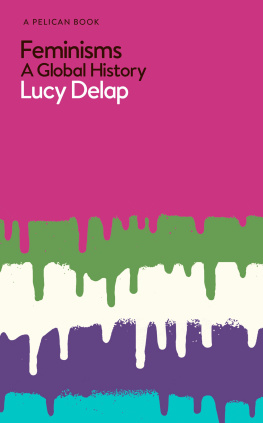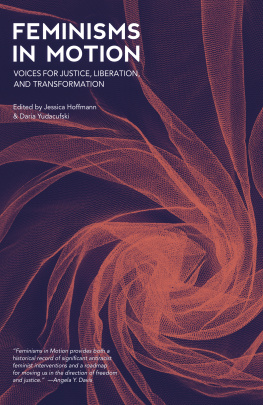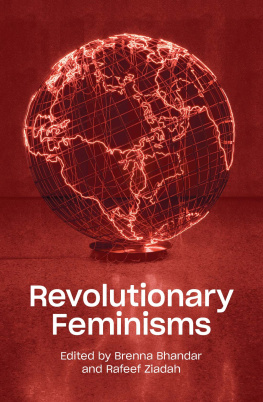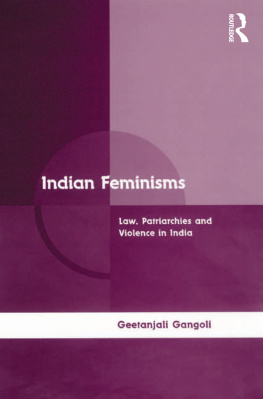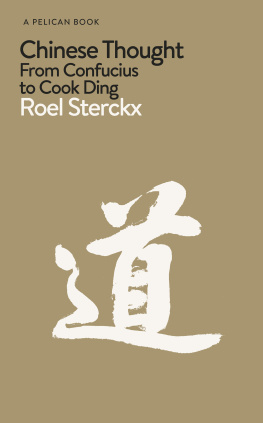Lucy Delap - Feminisms (Pelican Books)
Here you can read online Lucy Delap - Feminisms (Pelican Books) full text of the book (entire story) in english for free. Download pdf and epub, get meaning, cover and reviews about this ebook. year: 2020, publisher: Penguin Books Ltd, genre: Politics. Description of the work, (preface) as well as reviews are available. Best literature library LitArk.com created for fans of good reading and offers a wide selection of genres:
Romance novel
Science fiction
Adventure
Detective
Science
History
Home and family
Prose
Art
Politics
Computer
Non-fiction
Religion
Business
Children
Humor
Choose a favorite category and find really read worthwhile books. Enjoy immersion in the world of imagination, feel the emotions of the characters or learn something new for yourself, make an fascinating discovery.
- Book:Feminisms (Pelican Books)
- Author:
- Publisher:Penguin Books Ltd
- Genre:
- Year:2020
- Rating:3 / 5
- Favourites:Add to favourites
- Your mark:
- 60
- 1
- 2
- 3
- 4
- 5
Feminisms (Pelican Books): summary, description and annotation
We offer to read an annotation, description, summary or preface (depends on what the author of the book "Feminisms (Pelican Books)" wrote himself). If you haven't found the necessary information about the book — write in the comments, we will try to find it.
Feminisms (Pelican Books) — read online for free the complete book (whole text) full work
Below is the text of the book, divided by pages. System saving the place of the last page read, allows you to conveniently read the book "Feminisms (Pelican Books)" online for free, without having to search again every time where you left off. Put a bookmark, and you can go to the page where you finished reading at any time.
Font size:
Interval:
Bookmark:


- CHAPTER 1 :
Dreams - CHAPTER 2 :
Ideas - CHAPTER 3 :
Spaces - CHAPTER 4 :
Objects - CHAPTER 5 :
Looks - CHAPTER 6 :
Feelings - CHAPTER 7 :
Actions - CHAPTER 8 :
Songs
Lucy Delap is a historian of modern Britain, working on gender history and the history of feminism. She is currently a reader at the University of Cambridge, and Fellow of Murray Edwards College. Her book The Feminist Avant-Garde won the 2008 Womens History Network Prize, while her research has been awarded the Royal Historical Society Public History Prize for public debate and policy.
Alexandra Kollontai, Peoples Commissar for Social Welfare, with homeless children, c. 1917 (Alamy).
Tokyo members of Seitsha, 1911.
Maida Springer Kemp, 1936 (Kheel Center, Cornell University).
Funmilayo Ransome-Kuti (Alamy).
Anne Knight ( Religious Society of Friends (Quakers) in Britain; courtesy of the Library of the Religious Society of Friends in Britain, Friends House, Euston Rd, London).
Equality Brand Tea trademark, 1910 (Courtesy of the Secretary of State Records, California State Archives).
Front cover of Sister, the newspaper of the Los Angeles Womens Center, July 1973 (Feminist Library, London).
Dun Emer press room, c. 1903 (Trinity College Dublin Library; TCD MS 11535).
Womens Liberation badges (Ville de Paris/Bibliothque Marguerite Durand (BMD) and Joelle Patient).
Official portrait of Trinidad Fernandez Legarda, Queen of the Manila Carnival, 1924.
The Bloomer Costume, lithograph published by N. Currier, New York, 1851 (Courtesy of the Library of Congress, LC-DIG-pga-06193).
Mori dress reformers, c. 1906 (Image from Christchurch City Libraries. CCL-PhotoCD11-IMG0096).
Lady Constance Lytton in disguise, c. 1914 ( March of the Women Collective/Mary Evans Picture Library).
Woman wearing saya and manto, Lima, c. 1860-80.
Meena Keshwar Kamal, 1982.
Three participants in the Lavender Menace action at the second Congress to Unite Women, New York, 1970 (Diana Davis, New York Public Library).
The 1975 International Womens Year Tribune, Mexico City (Bettye Lane, Schlesinger Library, Radcliffe Institute, Harvard University).
Daisy Solomon and Elspeth McClellan outside 10 Downing Street, February 1909 (LSE Library).
Julieta Lanteri voting in Buenos Aires, 1911 (Courtesy of the Archivo General de la Nacin Argentina AGN_DDF/ Caja 2124, Inv: 115542).
Rosalie Bognor and Merle Thornton chain themselves to a bar, 1965 (Bruce Postle, Newsphotos).
Anna Julia Cooper (Photo Courtesy of the Oberlin College Archives).
Composer Ethel Smyth, 1912 (LSE Library).
A protestor in Parliament Square, 1982 (Edward Barber).
BUGA-UP: Billboard Utilising Graffitists Against Unhealthy Promotions
CEDAW: Convention on the Elimination of All Forms of Discrimination Against Women
CLIT: Collective Lesbian International Terrors
DCWLM: District of Columbia Womens Liberation Movement
ERA: Equal Rights Amendment
FEN: Feminist Economic Network
FFCU: Feminist Federal Credit Union
ICW: International Council of Women
IWSA: International Woman Suffrage Alliance
NAACP: National Association for the Advancement of Colored People
NGO: Non-Governmental Organization
NOW: National Organization for Women
NUSEC: National Union of Societies for Equal Citizenship
NUWSS: National Union of Womens Suffrage Societies
NWRO: National Welfare Rights Organization
oob: off our backs
RAWA: Revolutionary Association for the Women of Afghanistan
SPEW: Society for the Promotion of the Employment of Women
WCTU: Womens Christian Temperance Union
WIDF: Womens International Democratic Federation
WIN: Women in Nigeria
WSPU: Womens Social and Political Union
WTUL: Womens Trade Union League
UN: United Nations
YWCA: Young Womens Christian Association
In January 1886, a woman in the British-ruled Gold Coast (now Ghana) took up a pen to write an incendiary letter to the Western Echo, a local newspaper founded the previous year.
We Ladies of Africa in general are not only sadly misrepresented but are made the foot-ball of every white seal that comes to our Coast We have been sadly abused by people of such description, and because we have said nothing they continue to abuse us with impunity Although we have not white or angelic faces we are capable of as high a degree of culture as any white lady.
The letter speaks eloquently of her feelings of being kicked around by European colonists, of lack of respect for her culture, and the abuse and impunity of colonial governance as it impacted upon women. The writer was not just angry she also offered some satirical wordplay, terming white male power Just Ass rather than Justice. Her name does not survive, yet her willingness to speak for we Ladies of Africa draws our attention to her imagined community of African womanhood. Her forthrightness and breadth of vision were helped by local factors the long-standing African-owned press in the Gold Coast as well as the global reach of the womens movements of her day.
1886 was a moment of intense colonial expansion. Some of the major European powers were annexing African and Asian territory at speed, giving rise to a violent world order in which racial hierarchies and norms of sexuality became more strongly policed, and which radicals, nationalists and anti-colonialists would contest over the coming century. It was also a moment when womens education was flourishing throughout the globe, their access to (or coercion into) paid employment was growing, and the spread of the bicycle was inaugurating new mobilities and anxieties that would be epitomized in the bloomer-wearing new woman cyclist. It offers a way into a larger story of the profound transformations of how women thought about and inhabited their bodies and lives. Our story ranges both back and forward from 1886, to encompass 250 years of attempts to politicize the injustices of gender.
All who challenge the wrongs faced by women have approached it in ways deeply shaped by their own historical moment. Their ability to name themselves as feminists, women, ladies or sisters is always provisional. Their politics have been organized around divides of class, caste, ethnicity, religion, sexuality, nationality and age. No naming of an individual as feminist can be taken for granted. Nor can we impose feminism as a label onto the activism of women and men who would not have recognized it, or who actively rejected it.
We can use feminism as an entry point to understand better how campaigns over womens rights, new womanhood, the awakening of women or womens liberation might have shared concerns and tactics. But I will also be telling the story of the limits of feminism, its blind spots and silencings, its specificities and complicities. Even the idea of women (or, as nineteenth-century commentators often preferred, woman) has proved controversial. And gender, understood as the cultural and social organization of biological sex, has only become a commonly used term in the late twentieth century. This book traces out how feminists and activist women related to nationalism, religious doctrines, imperialism, utopianism and racial thinking. My aim is to offer feminist inspiration, showing how unexpected linkages and resonances emerge across different feminist generations and epochs. Inspiration must be set alongside a different story of conflicts and tensions. Feminist coalitions have long had their limits, and feminist concerns of the past dont always mesh easily with urgent contemporary efforts to make visible and stamp out the injuries of gender.
Next pageFont size:
Interval:
Bookmark:
Similar books «Feminisms (Pelican Books)»
Look at similar books to Feminisms (Pelican Books). We have selected literature similar in name and meaning in the hope of providing readers with more options to find new, interesting, not yet read works.
Discussion, reviews of the book Feminisms (Pelican Books) and just readers' own opinions. Leave your comments, write what you think about the work, its meaning or the main characters. Specify what exactly you liked and what you didn't like, and why you think so.


